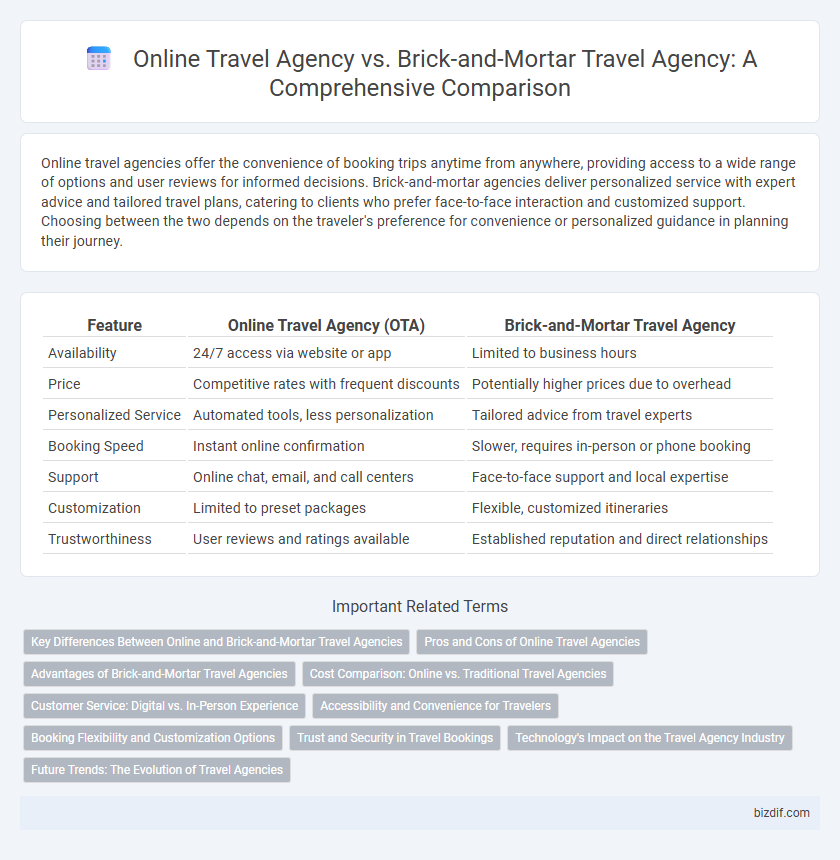Online travel agencies offer the convenience of booking trips anytime from anywhere, providing access to a wide range of options and user reviews for informed decisions. Brick-and-mortar agencies deliver personalized service with expert advice and tailored travel plans, catering to clients who prefer face-to-face interaction and customized support. Choosing between the two depends on the traveler's preference for convenience or personalized guidance in planning their journey.
Table of Comparison
| Feature | Online Travel Agency (OTA) | Brick-and-Mortar Travel Agency |
|---|---|---|
| Availability | 24/7 access via website or app | Limited to business hours |
| Price | Competitive rates with frequent discounts | Potentially higher prices due to overhead |
| Personalized Service | Automated tools, less personalization | Tailored advice from travel experts |
| Booking Speed | Instant online confirmation | Slower, requires in-person or phone booking |
| Support | Online chat, email, and call centers | Face-to-face support and local expertise |
| Customization | Limited to preset packages | Flexible, customized itineraries |
| Trustworthiness | User reviews and ratings available | Established reputation and direct relationships |
Key Differences Between Online and Brick-and-Mortar Travel Agencies
Online travel agencies offer 24/7 booking flexibility and access to extensive digital resources, enabling users to compare prices and itineraries in real-time. Brick-and-mortar agencies provide personalized customer service, expert local knowledge, and face-to-face consultations that enhance trust and customized travel planning. While online platforms emphasize convenience and cost-efficiency, physical agencies excel in tailored experiences and resolving complex travel needs through direct interaction.
Pros and Cons of Online Travel Agencies
Online travel agencies offer the convenience of 24/7 access, a wide range of options, and competitive pricing due to partnerships with numerous suppliers. However, they may lack personalized customer service and face issues with booking errors or hidden fees. Unlike brick-and-mortar agencies, online platforms sometimes provide limited assistance during travel disruptions, impacting overall customer satisfaction.
Advantages of Brick-and-Mortar Travel Agencies
Brick-and-mortar travel agencies offer personalized customer service through face-to-face interactions, enabling tailored travel planning and immediate problem resolution. They provide access to exclusive deals and packages unavailable online, leveraging established relationships with vendors and suppliers. Physical agencies also ensure trust and security, appealing to clients who prefer direct support and guided assistance throughout their travel experience.
Cost Comparison: Online vs. Traditional Travel Agencies
Online travel agencies offer lower booking fees and reduced operational costs compared to brick-and-mortar agencies, leading to more competitive pricing for customers. Traditional travel agencies incur higher expenses due to physical office maintenance, staff salaries, and overhead, which often translate into higher service fees. Customers seeking budget-friendly travel options typically benefit from the cost efficiencies provided by online platforms.
Customer Service: Digital vs. In-Person Experience
Online travel agencies leverage 24/7 digital customer support through chatbots and instant messaging, offering quick responses and convenient access worldwide. Brick-and-mortar agencies provide personalized, face-to-face interactions, allowing customers to consult travel experts for tailored advice and complex itinerary planning. The choice between digital and in-person service impacts the overall experience, with online agencies emphasizing speed and accessibility, while physical agencies prioritize personalized guidance and trust-building.
Accessibility and Convenience for Travelers
Online travel agencies offer unparalleled accessibility and convenience, allowing travelers to book flights, accommodations, and tours anytime from any location using devices with internet access. In contrast, brick-and-mortar agencies require physical visits during business hours, which can limit flexibility and increase time consumption. The 24/7 availability of online platforms, combined with instant comparison tools and user reviews, enhances decision-making and streamlines the booking process for modern travelers.
Booking Flexibility and Customization Options
Online travel agencies offer superior booking flexibility with 24/7 access and instant confirmation, allowing travelers to modify reservations easily through digital platforms. Brick-and-mortar agencies provide personalized customization options through face-to-face consultations, enabling tailored travel itineraries based on individual preferences and expert advice. Combining online convenience with in-person customization ensures optimal travel planning experiences for diverse customer needs.
Trust and Security in Travel Bookings
Online travel agencies invest heavily in advanced encryption technologies and secure payment gateways to protect customer data, enhancing trust during digital bookings. Brick-and-mortar agencies offer personalized support and face-to-face interactions, providing a tangible sense of security for travelers wary of online scams. Both models rely on transparent policies and verified partnerships with airlines and hotels to ensure safe and reliable travel arrangements.
Technology's Impact on the Travel Agency Industry
Technology has revolutionized the travel agency industry by enabling online agencies to offer instant booking, personalized recommendations, and 24/7 customer service through advanced algorithms and AI-driven platforms. Brick-and-mortar agencies now integrate digital tools like mobile apps and virtual reality tours to enhance in-person consultations and maintain competitive relevance. The rise of big data analytics allows both types of agencies to tailor travel packages, optimizing customer experience and operational efficiency.
Future Trends: The Evolution of Travel Agencies
The future of travel agencies is marked by a shift towards digital integration, where online platforms leverage AI and machine learning to offer personalized travel experiences. Brick-and-mortar agencies are evolving by incorporating virtual reality tours and hybrid service models to meet changing consumer demands. Enhanced connectivity and blockchain technology are also expected to streamline bookings and increase transparency in the travel industry.
Online agency vs Brick-and-mortar agency Infographic

 bizdif.com
bizdif.com